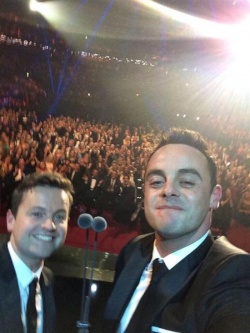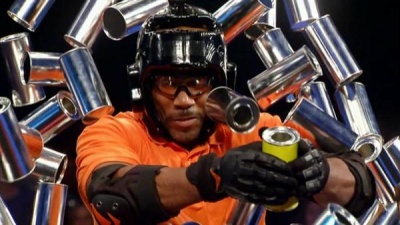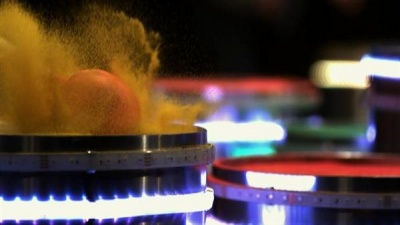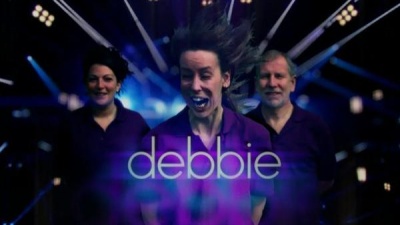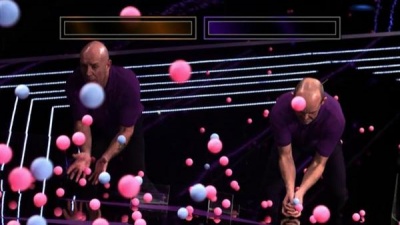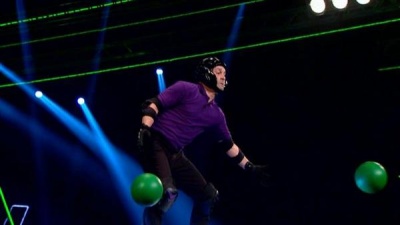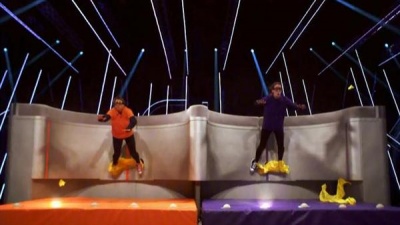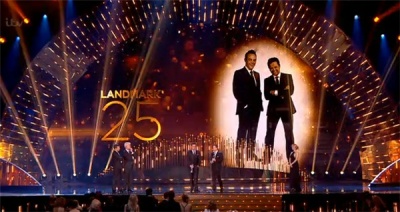Weaver's Week 2014-01-26
Last Week | Weaver's Week Index | Next Week
It's not every week that Ant McPartlin gets to take a selfie from the ITV National Television Awards, while he and Declan Donnelly are being given the lifetime achievement gong.
Contents |
Reflex
Objective Productions for BBC1, from 11 January
It's almost five years since The Cube came to ITV's weekends. The makers, Objective Productions, quickly began work on their next format. That show turned out to be all about swiftness of movement. Going on the b of the bang. The programme was turned down by Channel 4 in 2011, and a pilot was made for the BBC a year later. Eventually, the programme was picked up for a series, which recorded in spring last year, and finally came to air at the start of this new year.
There are three strands to Reflex: the games themselves, the way they look on screen, and the commentary. The games are played amongst family teams of three, all related in some way, and all aged 18 or over. As games go, they're not terribly challenging: hit whichever drum is lit, or smash a bottle. A child of five could understand what the players are being asked to do.
All of the games rely on fast reactions, on seeing a stimulus and doing something. The players need to move very quickly, often the games are completed in less than two seconds. It makes some of the challenges on The Cube look like War and Peace, dragging on as they do for a full tenth of a minute. Strung together, we'd find a winner in less time than it takes Gyles Brandreth to win Just a Minute, or Splash! needs to film a night's action.
With such flimsy content, it's the presentation where Reflex needs to shine. Objective have learned from many series of The Cube, and have managed to come up with a style that takes these very slight games and turns them into proper television spectacles. They begin with super slow-motion cameras, able to maintain a quality picture when slowed down to a tenth, a hundredth, a thousandth of the usual speed. We don't just see the stick hitting the drum, and the splash of sand. We see the stick descend, the skin of the drum ripple and wobble, and after a moment, the covering slowly rises up to demonstrate a successful hit. Done well, it's a thing of beauty.
But the style goes further than that. There are replays from all sorts of angles, some of which we might expect, some of which we might not. Two players crashing through a pane of glass (yes, they've done that) got filmed from the front, from the side, from behind. About the only angle we didn't see was a contestant's-eye view from cameras mounted to their head.
Time isn't just capable of being speeded up and slowed down. It can flow backwards, too; a game might begin, have action shown from one angle, so that we think that something is going to happen. Then the arrow goes into reverse, the tape is rewound, we see it from many more angles. Our expectations might be confirmed, they might be confounded. At some point, we get to see the result, and eventually to see the whole game play in real time. Some commentators would prefer a "show it in real time and then in replay" argument. We disagree, not when the results are determined in the blink of an eye, and not when the production is the spectacle.
And there are more stylish tricks. Through obvious television trickery, people zip about all over the place, leaving a coloured contrail behind them. And the families have been filmed in a wind tunnel. There's no obvious reason for this, it doesn't help them to perform in the games, no-one will be judging them on Best Performance in a Howling Gale for the end-of-series awards. It's just for effect, and so that they can look a bit different during introductions and scoring.
So we turn to the audio, and a very moreish soundtrack – light and delicate, like a music box unwinding, before suddenly diving into harder notes and chords. Not that we get to hear very much of this, because there's always someone talking over the top. It's Ken Bruce, from Radio 2's Ken Bruce Show. He tells us what's happening on screen, and cracks as many sillies as he can.
Opinion is divided on this, some people reckon the comedy is the highlight of the programme, others that he really gets in the way. Our view is that some sort of commentary is essential. Reflex is different from The Cube, and one way of demonstrating this is by not taking itself as seriously. Does that forgive the headlong dives into slapstick? No. There's too much daft-silly, maybe the detail of the tone is wrong.
On the other hand, we must remember that Reflex was originally developed with one eye on Channel 4. It wouldn't surprise us to find that the voiceover was intended to be super-snarky, like Dave Lamb on Come Dine with Me only even more cutting. What works for the cool youth station isn't right for family viewing on BBC1, and it's right to be toned down and made more accessible to the younger viewer. Even so, we don't think Ken Bruce is quite the right choice for the commentary booth: Sue Perkins was the best human on Don't Scare the Hare a few years ago, and might have reprised her voice here.
The first half of the programme is varied, with games changing every week – after three episodes, no repeats – and Shane Richie linking them together. The host here is slightly superfluous, he only reinforces the commentary and asks banal questions of the contestants. The second half is the same on every show: the winning family is determined by a button-pushing quiz, where players are to push when they see something on the screen – when the time reaches 2pm, or they see a dog without sunglasses. First to push gets a point, push when something else shows and a point is given away. It's the first to ten points that wins, and there's always the possibility of a complete anti-climax, when the game is lost by someone getting trigger-happy.
One member of the winning side then plays the bonus game. They climb onto a podium, and attempt to make contact with 15 green balls, shot in their general direction. Then they must avoid touching 15 red balls, still shot in their general direction. Should the number of greens exceed the number of reds, then the family wins a flat £10,000. They have the option to go double-or-quits, touching one final golden ball requiring a leap of faith from the pedestal. This is an unlikely gamble and tends to leave a flat ending: perhaps if the green-minus-red balance was paid at £1000 per ball, the stakes might be higher and the final challenge worth taking.
Reflex will live or die by its editing, and the opening programme felt sloppy: there were obvious chops in some of the talk with the players, as if the producers had had to lose five minutes just before transmission. This wasn't so obvious in the later episodes we've seen. Certainly Reflex has something The Cube doesn't: we can watch it without feeling queasy. We're not sure whether it's the colour scheme (gold and purple and black versus red and white), or the editing style, or the fact there aren't many spinaround shots. All we know is that our chip supper never threatens to appear on a tumshift channel.
As good as it is technically, and as enjoyable as it is, we found Reflex to be completely insubstantial. By the time Who Dares Wins came along an hour later, we'd completely forgotten Shane and Ken's programme. Will we remember to tune in when it returns after the rugby break? Maybe. Maybe not.
University Challenge
Group Phase 1, Match B: Cardiff v SOAS
Exeter and Liverpool have fallen to the dragons this series; the School of Oriental and African Studies have taken out Southampton and Reading, so they'll get no support from elsewhere in the game show fandom. Not even when they get the opening starter, and a set of quotations about power. "Buerke's!" is the shout, it's an answer to the question and not a commentary on the team.
Right, enough snideity, let's be fair to SOAS. They do very well on questions about some of the oldest people with entries on the IMDB; by limiting it to German people, the question-setters sidestep a namecheck for Barry Cryer. "Discontinued in 22BC..." is a question about the earliest censors; their descendants can now be seen in an office block near Southwark Bridge. The first visual round is on cities of the former Czechoslovakia, it goes to SOAS, as has every correct answer; they lead by 95-(-5).
And we've had a lot of incorrect answers; shortly after this, we reach 5 starters answered correctly, 5 missed by both sides, with a missignal each. Cardiff finally gets a starter, only to be told "Your bonuses are on electromagnetic radiation". Lovely. Now, which United Station president was the first to have their inauguration broadcast over the internet? Bill S. Clinton, Esq is the answer they have, but was there a text commentary of Ford's inauguration on the ARPAnet in 1974?
How transitory is fame? Eight years ago, the Arctic Monkeys sold a quarter of a million copies of their album Whatever People Say I Am, That's What I'm Not. This week, none of the teams can come close to remembering what it's called. We did like SOAS's cheeky idea that a film with a one-letter title could be called "Omega". More of this creative thinking, please! With five minutes and a hundred points, it's unlikely that Cardiff can pull back the game, but they do enough to avoid a tonking. SOAS's winning score is 200-90, and the overall accuracy rate was 42/81.
This Week and Next
Democracy Season continued. The winners in the UK Gameshows / Bother's Bar Poll of the Year 2013 were Five Minutes to a Fortune (Best New Show), Pointless (Best Show In Production), and The Genius (Best International Show).
Winners were also announced in the ITV National Television Awards, where Ant and Dec were named an official Television Landmark. They also picked up the Most Popular Entertainment Presenter for the thirteenth (count 'em!) year in a row, and won Most Popular Entertainment Show for I'm a Celebrity... Get Me Out of Here!. Most Popular Talent Show went to Strictly Come Dancing. The other game shows vanished into the ether.
On the show, there was a performance by Sam Bailey. She won The X Factor a few years ago. (Last month? Really?!) Her album comes out on 24 March, somewhat earlier than the usual release date in the autumn. It's as if Simon Cowell thinks we'll have forgotten about her by the end of the year, as though she's the audio equivalent of Reflex.
So, why did they not air this episode of Mastermind after the celebrity editions? It was a very good sample of the civilian show: nothing spectacular happened, no-one embarrassed themselves, and the contest was open until the very final moments.
- Paul Gregan (Alfred Wainwright's Pictorial Guides to the Lakeland Fells) took a series of guidebooks published immediately after the war, and deviser of the Coast to Coast Walk across the middle Pennines. 7 (3) wasn't promising, but Mr. Gregan is a journalist, and they tend to have flypaper memories. He remembers the geography of Belarus and Ukraine, the basilisk, but confuses Superstars with Gladiators. Answering swiftly and crisply, he finishes on 18 (7).
- Ailsa Prosser (Charles Rennie Mackintosh), answered on the architect and rainwear pioneer. Though she got the first question wrong, the contender answered carefully and precisely, reaching 8 (1). She's asked questions about the origins of the Three Choir festival, and the new queen of 1553; this isn't Millionaire, she isn't allowed to Phone A Friend (Or Barry Cryer). Slow and steady is the watchword: thinking about answers, and getting the vast bulk of them to finish on 20 (4).
- Roderick Cromar (Sam Phillips and the Sun Record Label 1950-60), a subject best known for signing Elvis Presley, Roy Orbison, and others from the dawn of rock 'n' roll. The final was 9 (2), enhanced by knowing the number of the beast: this week, it was 0300 as Mark Labbett appeared in a tabloid's gossip column. This round's going to Hull (pace Larkin's description) and Abingdon, but mostly it's going up the scoreboard. Lots of correct answers, a few good but incorrect ideas, and a final of 24 (3). A bit more luck on his specialist round and this contender could be really dangerous.
- James Knight (Sharpe novels of Bernard Cornwell) was answering on the novels of the Napoleonic war, later dramatised with Sean Bean in the title role. The contender answered, answered correctly, and secured a Perfect Round of 14 (0). Eleven to win is the corridor of uncertainty, not impossible but not easy. The contender starts with four correct answers, falls into a pass spiral, rescues himself with the plot of Cars, and finishes with a score of 22 (7).
Slightly to our surprise, and perhaps to his own, Roderick Cromar has won tonight's show, and will do it all over again in the second round.
The BARB Ratings Five Points, for the week ending 12 January.
- While Sherlock remained the most viewed show of all, BBC The Voice of Holland of UK returned with 9.35m viewers.
- ITV's Splash! was badly dented; 3.45m puts it well behind Who Dares Wins (5.85m) and Celebrity Mastermind (4.65m on Sunday) and roughly level with Reflex and University Challenge (3.35m).
- Dancing on Ice (5.65m), Family Fortunes (4.65m), and Take Me Out (4.05m) also had the better of the diving.
- Celebrity Big Brother reached its first eviction proper with 2.85m viewers remaining; 2.3m saw 8 Out of 10 Cats Does Countdown, and 1.9m for The Taste. Civilian Mastermind improved to 2.25m.
- Top digital game show was Four in a Bed on More4, its 375,000 was 45,000 ahead of Come Dine with Me on the same channel.
Coming up: Experimental television in The Jump (C4, from Sunday). Known formats, too: Dragons' Den (BBC2, 9pm Sunday), Coach Trip (C4, 5.30 weekdays), Sion a Sian (S4C, 8.25 Tuesday), and the last-but-one edition of Who Wants to be a Millionaire (ITV, 8pm Tuesday). No Reflex for a fortnight, it's squeezed out by the international rugby. Splash! kicks off at 6.50, and The Voice UK at 7.10.
To have Weaver's Week emailed to you on publication day, receive our exclusive TV roundup of the game shows in the week ahead, and chat to other ukgameshows.com readers, sign up to our Yahoo! Group.

